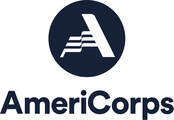|
Read the Preservation Alliance of West Virginia's 2021 Annual Report. Check out the .pdf or scroll down to see the report in images.
2 Comments
The BRAMWELL FOUNDATION, a nonprofit 501(c)(3) organization, is currently soliciting quotations for the completion of THE PENCE HOTEL STABILIZATION PROJECT grant funded by the PRESERVATION ALLIANCE OF WEST VIRGINIA. This is a historic building project that must follow the Secretary of Interior Standards for Rehabilitation. The Pence Hotel was built around 1911 and is located on Main Street, Bramwell, WV. SCOPE OF WORK NEEDED
STAGE 1: WORK TO BE COMPLETED 1. Conduct a mortar test to determine the composition of the historic mortar and to ensure a close match. Submit a photograph of the sample and historic mortars to the grantor, the Preservation Alliance of West Virginia for approval. Do a test area to ensure the color matches once it dries. 2. Secure and relay loose bricks located above (4) brick arched windows. 3. On the west and south exterior walls, remove and replace all loose brick with brick matching the original as closely as possible 4. Hand rake the existing masonry joints to clean out the remaining mortar and any false work. Re-point all exterior masonry joins, replacing all loose or missing mortar with the approved mortar sample. STAGE 1: APPLICATION PROCESS 1. Secure the area to protect persons & property from any falling debris below the work area(s). Remove any loose brick. Prep work area. Relay of brick in arched pattern consistent with original building structure. Cleanup of areas relating to that project. 2. Either scaffolding or a custom-built workbox to be erected. STAGE 2: WORK TO BE COMPLETED 1. Secure all orifices exposed to outside elements (36 window openings/ 7 doors). 2. Cover window and door openings with appropriate heavy gage plastic to seal from weather. STAGE 2: APPLICATION PROCESSES 1. Attach plastic firmly to current window frames or install temporary framing where necessary. QUALIFICATIONS: The contractor hired must meet the following qualifications: 1. Have performed similar work in the past or be able to prove ability to do work that meets the Secretary of Interior Standards for Rehabilitation. 2. Submit 2 project summaries with references and contact information. 3. Proof of general liability insurance and contractor’s license. 4. Ability to complete PENCE HOTEL STABILIZATION PROJECT by DECEMBER 31, 2022. EXPRESSIONS OF INTEREST: Companies or individuals interested in submitting a bid or quote on the project should submit a detail of costs, project summaries, references, proof of general liability insurance, and a copy of their contractor’s license to the BRAMWELL FOUNDATION, PO BOX 193, BRAMWELL WV 24715. Bids/quotes are due by 12 pm on Saturday, Saturday March 5, 2022. SELECTION PROCESS: THE BRAMWELL FOUNDATION and the grantor, the Preservation Alliance of West Virginia, will review all proposals and select a contractor for the project based on: 1. Experience with similar types of projects, 2. Proven ability to complete a project in a timely manner, and 3. Competitive cost to complete the project. A selection will be made within two weeks and a contract will be worked out immediately with the company. PAYMENT PROCESS: One third (1/3) of the contract amount will be paid the day the work begins, and the remaining two thirds (2/3) will be paid upon satisfactory completion of the project. Further questions regarding the project or for an appointment to access the building contact John Houston 304-248-7382.  ELKINS W.Va. – The Preservation Alliance of West Virginia announces it has joined West Virginia BusinessLink as a Resource Partner available to the state’s small businesses. West Virginia BusinessLink assembles an array of resources in one online destination. “We welcome all Resource Partners to West Virginia BusinessLink,” said Secretary Mitch Carmichael, West Virginia Department of Economic Development. “Our goal is for West Virginia to be competitive as a great place for businesses to locate, start and grow successful. Providing support through resources such as West Virginia BusinessLink and every great Resource Partner helps make that possible.” PAWV services all types of historic building projects and assists all types of building owners such as residential homeowners, commercial developers, and public agencies. PAWV's services include technical assistance and guidance in areas of financing, fundraising, obtaining estimates/bids, and historic preservation in general. PAWV also offers a short-term microloan with a fixed interest rate and competitive grant funding to help bridge the gap in redevelopment projects involving historic buildings. To utilize BusinessLink, West Virginia’s business owners and entrepreneurs can visit wvbusinesslink.com, use the “Connect to Resources” box to find resources in a specific area, explore upcoming training and networking events in the calendar, and find supportive information in the “STARTUP, “GROWTH” and “FUNDING” tabs. In the “Connect to Resources” box, website visitors can answer questions about their company and what they need. BusinessLink analyzes the replies, scours the database of Resource Partners, calculates the best matches and responds to the business owner with referrals. The process of searching for resources and providers becomes faster and more effective. BusinessLink is free to use and available 24/7. One-on-one appointments to discuss business needs can also be requested by calling 888-982-7232. Services available from BusinessLink Resource Partners include the following:
“West Virginia BusinessLink makes it easy to find all the resources a small business owner needs. It connects them with the right resources at the right time,” said Director Debra Martin, WV Small Business Development Center. “Until now, it was difficult and time consuming to determine what agencies and organizations are available to help small business owners and entrepreneurs. We hope BusinessLink resolves this issue and helps position these individuals and their businesses for long term success.”
economic development efforts throughout the state. Historic preservation can have a significant positive impact on downtown revitalization, business viability and growth, job creation, tax revenues, property values and tourism activity – all of which provide opportunities to combine her personal interests and professional position.
Debra recently completed a Historic Preservation certificate program through Bucks County Community College and is a certified Historic Real Estate Finance Professional. She also serves at the national level on the accreditation committee of America’s SBDC. Thank you, Debra, for your enthusiasm and service! Written by Samuel Richardson, Preserve WV AmeriCorps member serving at the West Virginia & Regional History Center (Samuel (left) pictured above with Dr. Emory Kemp (right))
It was no surprise that I was going to face some serious challenges in my Year of Service with AmeriCorps. I would be examining and arranging the life’s work of Dr. Emory Kemp, with the goal of making his 300 box collection of blueprints, maps, restoration project reports, structural analysis papers, drawings, correspondence, and much more accessible to patrons of the West Virginia and Regional History Center (WVRHC). Public History, as an academic field, was foreign territory for me. However, as a graduate from the Public Administration program at West Virginia University, I was prepared to tackle any project that served the public’s interest. The transdisciplinary shift was a challenge, but complimented my “Clifton Strength’s Finder” examination which discovered my strength in adaptability. Transdisciplinary shifts into public history are not unheard of, as according to Dr. Kemp, the structural mechanics PhD, was moved from civil engineering to the History Department at West Virginia University. Despite resistance in his early educational career to studying history as an academic discipline, he choose to remain in engineering. His resistance however, was no match for the orders of West Virginia University President James G. Harlow, who would implore Dr. Kemp lead the newly founded Institute for the History of Technology and Industrial Archaeology in the Department of History, not engineering. This was one of the many anecdotes that developed in the Monday afternoon meeting with the retired academic stalwart. Perhaps, in the process of officially retiring, as he promises his newest developing book on the Big Sandy River will be his last. The materials in the collection were assembled to support projects over Dr. Kemp’s 50 year career. The materials were arranged in a manner with no particular emphasis on a preserved original order. Dr. Kemp stated that he expected the professional expertise of the faculty and staff at the WVRHC to arrange the materials in a fashion that would make his work most accessible to researchers. Kemp also agreed with the proposed series arrangement, where WVRHC faculty member, Jane LaBarbara, and I hope to divide the collection into three major series, Kemp’s Personal Library, Publications by Kemp, and finally, “Subject Files” or “Research Projects.” In hopes of understanding which areas of the large collection are appropriate to highlight and exhibit, Dr. Kemp will provide Jane and I with a list of 35 projects that were of noteworthy accomplishment and could be listed as potential engineering breakthroughs. Some of which, were his role in the construction of the Sydney Opera House, and saving the Baltimore Gas and Electric Company potentially millions of dollars, by engineering a way for them to integrate new equipment without completely destroying an older building. Kemp hopes to sit down with LaBarbara and me to discuss each of the projects in further detail. 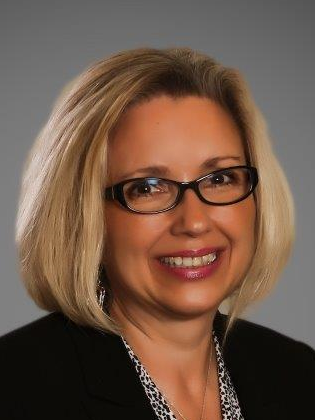 Photo credit: West Virginia Department of Commerce Photo credit: West Virginia Department of Commerce Monica Miller, President of M Miller Development Services, recently joined the board of the Preservation Alliance of West Virginia. After a career in state government, most notably managing the Main Street West Virginia program where she worked with businesses and community leaders statewide, Monica is putting her vast experience to work as a small business owner specializing in community economic development, downtown revitalization, organizational management and development, planning, facilitation, fundraising, speaking engagements and advocacy. Monica has served in various leadership roles in preservation at the state and national levels. She managed the Main Street West Virginia program for over 20 years. Prior to that she worked for West Virginia’s premier state parks system. She was the founding chair of the National Main Street Coordinating Programs Executive Committee, is chair emerita and current member of the National Trust for Historic Preservation’s Board of Advisors, represented Main Street and the Advisors on the National Trust Board of Trustees where she was vice-chair of the Community Revitalization Committee, and currently serves as the campaign chair of the Diversity and Inclusion Fund for the National Trust. She is a frequent speaker at national conferences. When asked about her interest in preservation, Monica says that communities that capitalize on their unique assets, architecture, small businesses and leadership are attractive to residents, investors and tourists. The connection of place is important to economic development whether attracting industry or other development. It all comes down to great communities being more economically viable. Thank you, Monica, for being a part of our team at PAWV! 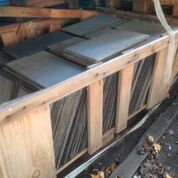 The Mon River Trails Conservancy is needing to sell 10 crates of roofing slate (some used, some new) and are in a time crunch. It is being stored at a project site in Masontown, WV which is soon to become a restroom for the Deckers Creek Rail-Trail. The organization had considered using this slate for a new roof but now have shifted to a different plan. The organization has set up a Craigs Listing to sell the slate, but you can contact Ella Belling directly for more information at [email protected] Link to Craigs List Morgantown: https://morgantown.craigslist.org/tls/6482095532.html ‘Matewan’ Director John Sayles to Attend Launch of Blair Centennial Project
The National Endowment for the Humanities (NEH) announced today that the West Virginia Mine Wars Museum is the recipient of a $30,000 challenge grant for their long-term project to commemorate the 100th anniversary of the Battle of Blair Mountain in 2021. Though still four years in the future, planning for the Blair Centennial Project has already begun. A celebration of the 30th anniversary of the release of John Sayles’s acclaimed film about the West Virginia Mine Wars, Matewan, will take place this October. Sayles and his producer partner, Maggie Renzi, will both attend screenings of the film in Charleston. All proceeds from the event will benefit the Centennial project. The museum will be releasing more details about the screenings in coming weeks. The five-day Battle of Blair Mountain unfolded on the border of Boone and Logan counties and pitted unionist coal miners against local law enforcement and citizen militias. The Blair Centennial Project will consist of five days of fun, interpretive activities spread out across the coalfield counties where the conflict took place. The NEH grant makes it possible for the Museum to hire a director to coordinate the activities. The grant is also intended to increase the museum’s fundraising capacity, while creating connections among humanities organizations across southern West Virginia. PAWV IS SEEKING PROFESSIONAL SERVICES TO DEVELOP OPERATING GUIDELINES FOR REVOLVING LOAN FUND4/30/2017
The Preservation Alliance of West Virginia (PAWV) will be establishing a historic preservation revolving loan fund to support historic preservation projects in the state of West Virginia. To meet that goal, PAWV plans to engage professional services of a consultant (firm) who is an expert in the disciplines of revolving fund mechanisms, real estate development, and historic preservation. The successful proposer will work closely with a PAWV committee to develop Operating Guidelines and materials for the new revolving loan fund.
BACKGROUND Formed in 1982, the Preservation Alliance of West Virginia (PAWV) is the only statewide, grassroots, nonprofit organization dedicated to the preservation of the Mountain State’s cultural heritage. PAWV’s formal mission is, “With a commitment to preserve our unique cultural heritage, PAWV and its members work to save our past for the present and future, supporting and promoting historic preservation through education & outreach, advocacy, preservation tools, and heritage tourism.”
|
News and NotesCategories
All
Archives
May 2024
Subscribe to our mailing list to receive e-news updates on historic preservation news and events in West Virginia.
|
Get Involved |
Programs |
Contact UsPreservation Alliance of West Virginia
421 Davis Avenue, #4 | Elkins, WV 26241 Email: [email protected] Phone: 304-345-6005 |
Organizational Partners:
© COPYRIGHT 2022 - PRESERVATION ALLIANCE OF WEST VIRGINIA. ALL RIGHTS RESERVED.

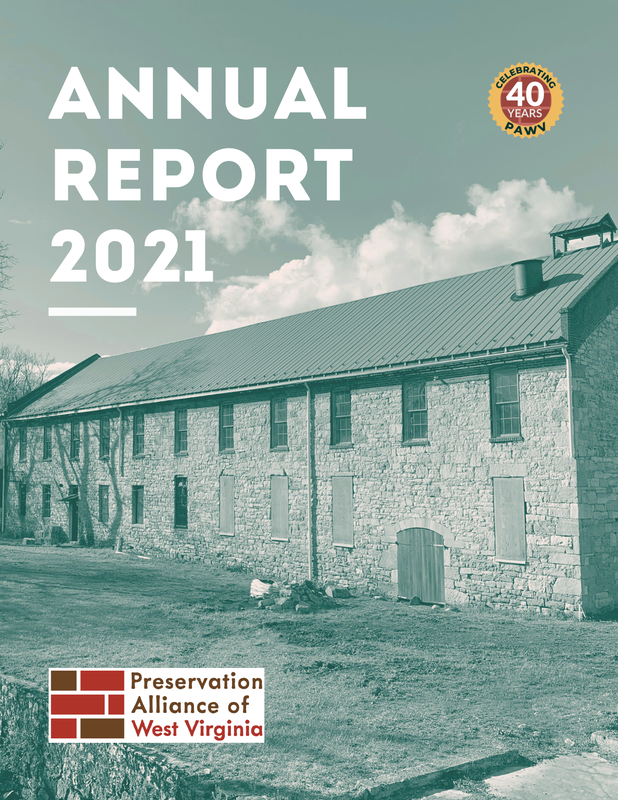
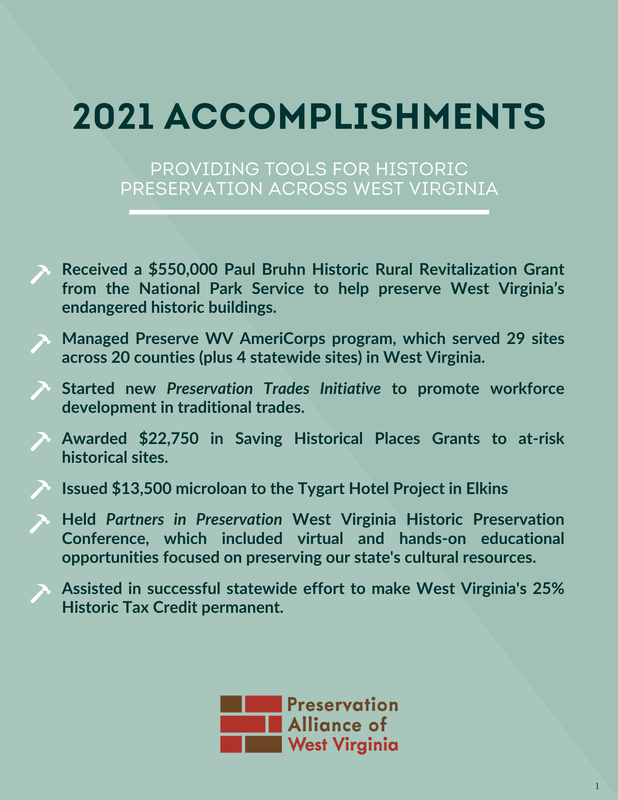
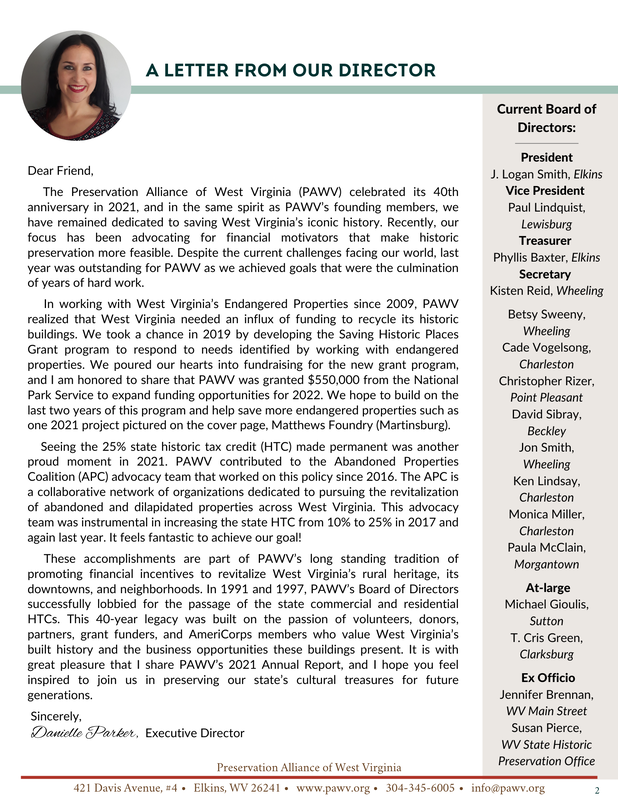
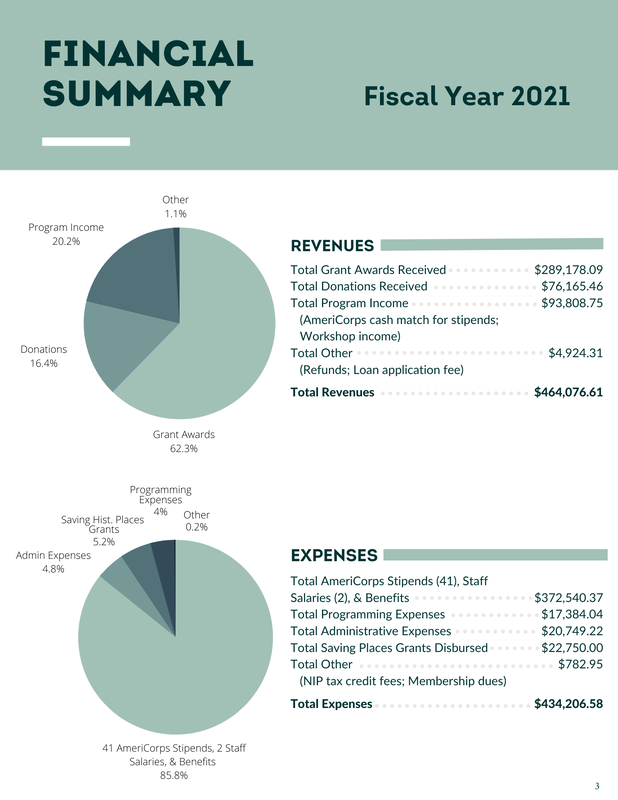
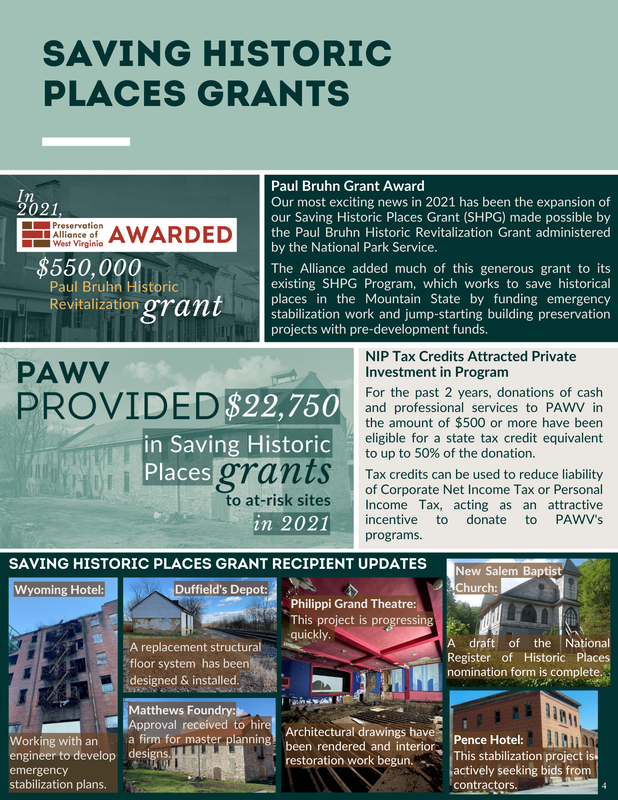
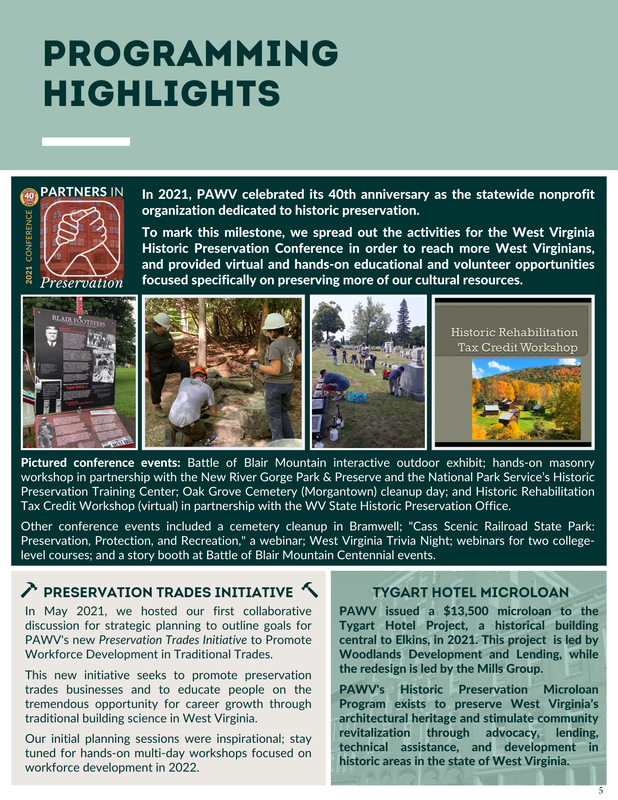
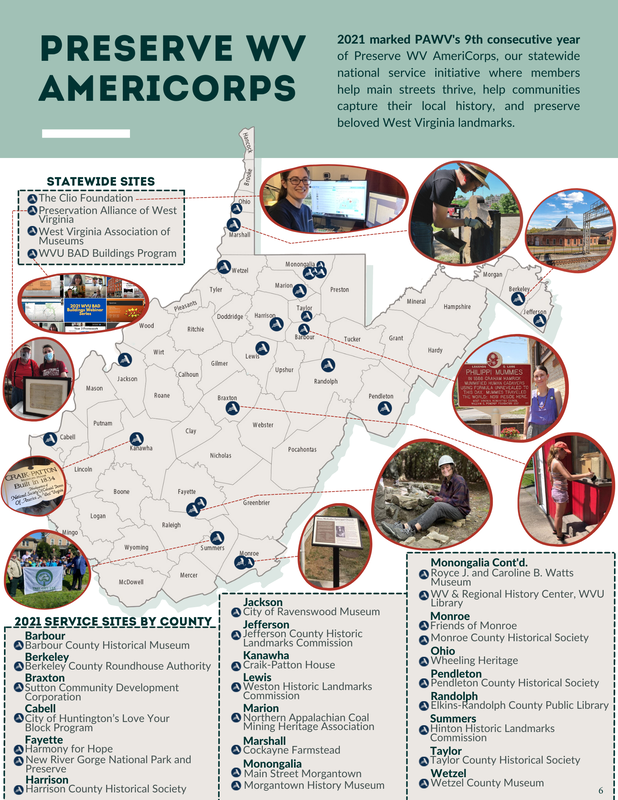
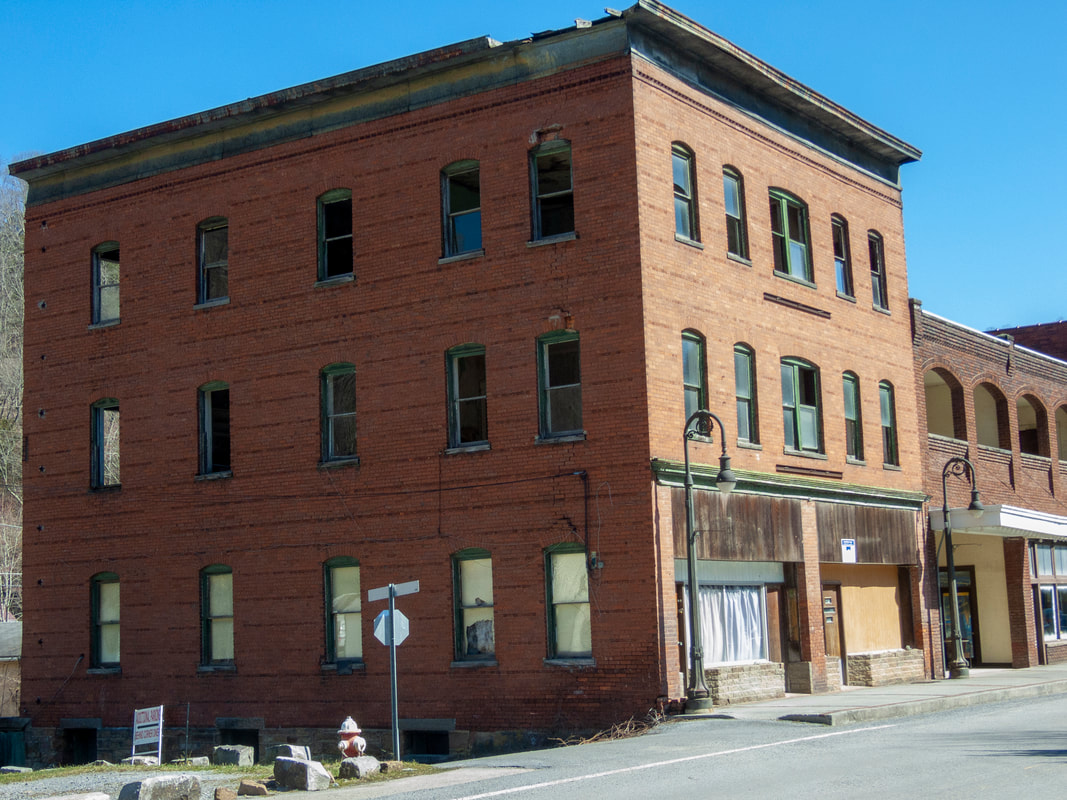
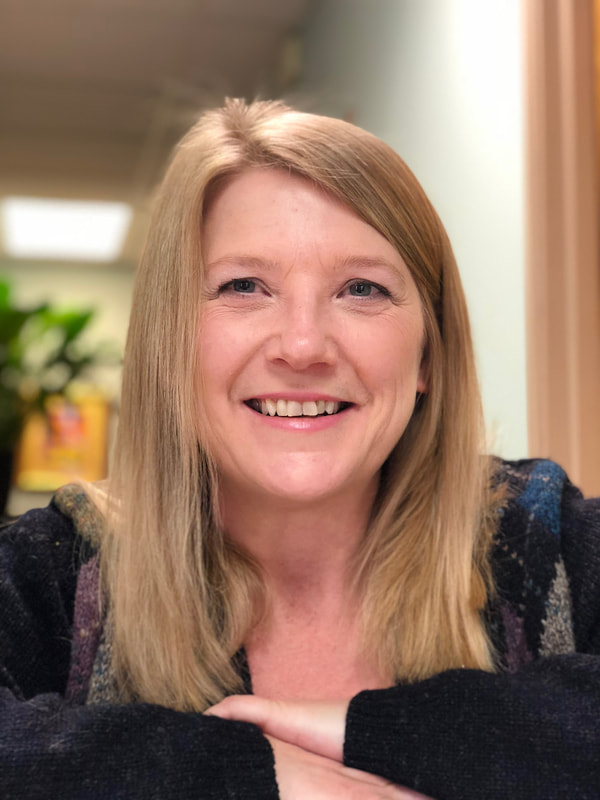
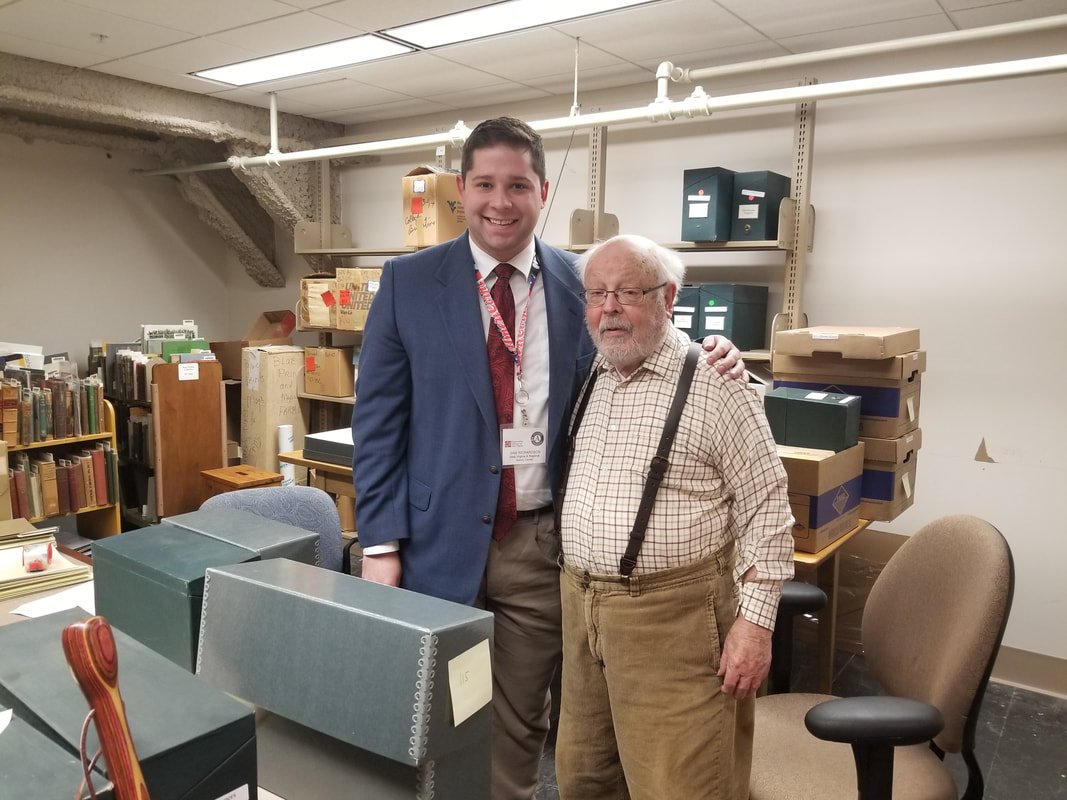

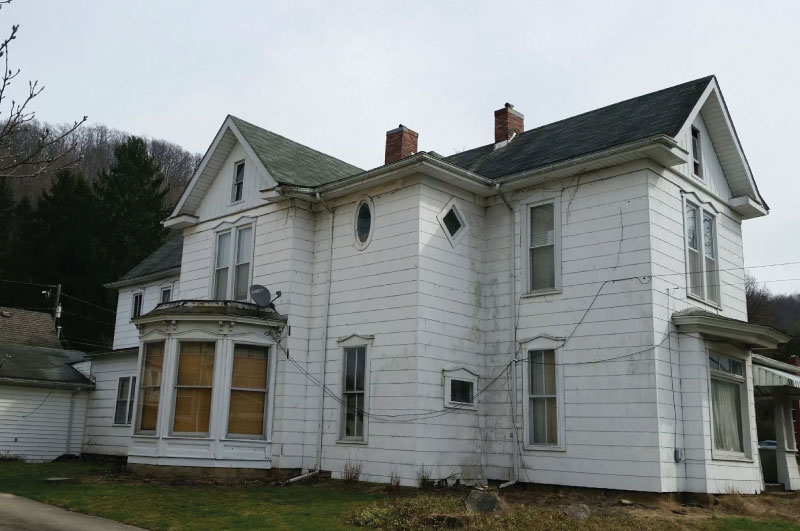
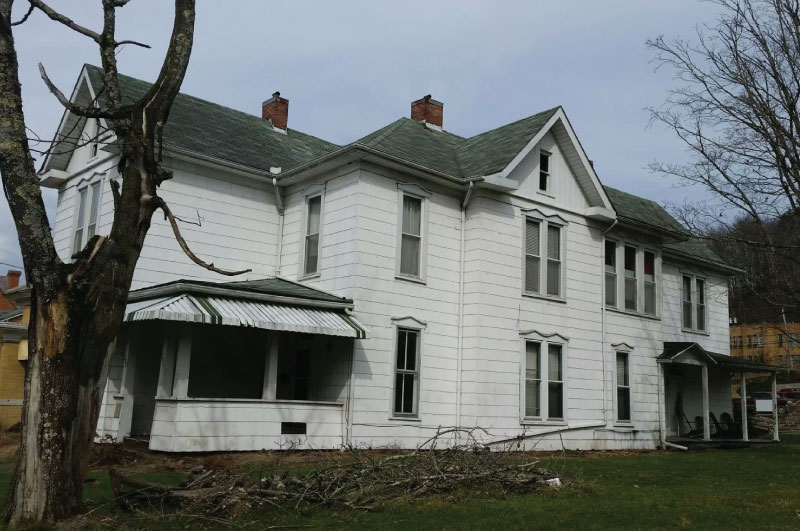
 RSS Feed
RSS Feed

